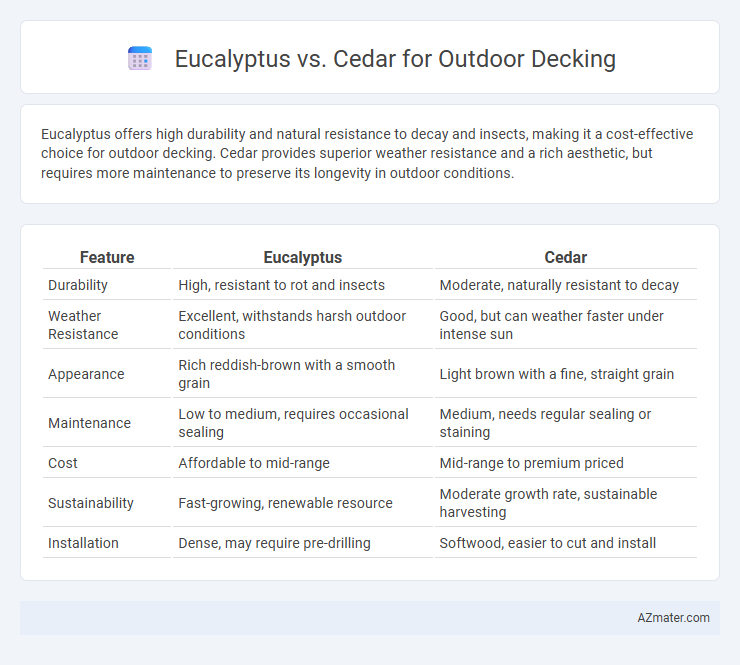Eucalyptus offers high durability and natural resistance to decay and insects, making it a cost-effective choice for outdoor decking. Cedar provides superior weather resistance and a rich aesthetic, but requires more maintenance to preserve its longevity in outdoor conditions.
Table of Comparison
| Feature | Eucalyptus | Cedar |
|---|---|---|
| Durability | High, resistant to rot and insects | Moderate, naturally resistant to decay |
| Weather Resistance | Excellent, withstands harsh outdoor conditions | Good, but can weather faster under intense sun |
| Appearance | Rich reddish-brown with a smooth grain | Light brown with a fine, straight grain |
| Maintenance | Low to medium, requires occasional sealing | Medium, needs regular sealing or staining |
| Cost | Affordable to mid-range | Mid-range to premium priced |
| Sustainability | Fast-growing, renewable resource | Moderate growth rate, sustainable harvesting |
| Installation | Dense, may require pre-drilling | Softwood, easier to cut and install |
Introduction: Eucalyptus vs Cedar for Outdoor Decking
Eucalyptus and cedar are popular wood choices for outdoor decking due to their natural durability and resistance to decay. Eucalyptus is a dense hardwood with exceptional strength and a high resistance to moisture, making it ideal for long-lasting decks in wet climates. Cedar, a softer wood, boasts natural oils that repel insects and resist rot, offering a lightweight yet durable option with a rich, warm appearance for outdoor spaces.
Durability and Lifespan Comparison
Eucalyptus decking offers high density and natural oils that enhance resistance to decay, providing a lifespan of 15 to 25 years when properly maintained. Cedar features natural anti-fungal properties and stability, typically lasting between 10 to 20 years but may require more frequent maintenance in harsh climates. Both woods perform well for outdoor decking, with eucalyptus generally providing superior durability and a longer lifespan due to its harder and denser composition.
Weather Resistance and Performance
Eucalyptus wood offers superior weather resistance due to its dense, oily composition, making it highly durable against moisture, rot, and insect damage in outdoor decking. Cedar, while naturally resistant to decay and insects, is softer and more prone to surface wear and requires regular maintenance to maintain performance in harsh weather conditions. Choosing eucalyptus decking ensures longer-lasting structural integrity and lower maintenance costs compared to cedar in environments exposed to heavy rain and humidity.
Maintenance and Care Requirements
Eucalyptus decking requires regular sealing and oiling to maintain its natural resistance to moisture and insect damage, preventing warping and splitting. Cedar decking benefits from its natural oils that provide decay resistance, but periodic cleaning and reapplication of protective stains or sealants are essential to preserve color and prevent surface checking. Both woods demand routine inspections and prompt repairs to ensure longevity and aesthetic appeal in outdoor environments.
Aesthetic Appeal: Color and Grain Differences
Eucalyptus decking offers a rich reddish-brown hue that deepens over time, showcasing a smooth, fine grain that provides a warm and inviting aesthetic. Cedar, on the other hand, features a lighter, natural reddish-pink tone with a distinctive straight grain and occasional knots, lending a rustic charm to outdoor spaces. The color stability of cedar complements weathered environments, while eucalyptus's vibrant grain pattern enhances contemporary and modern decking designs.
Sustainability and Environmental Impact
Eucalyptus decking offers rapid growth and natural resistance to decay, making it a renewable and sustainable choice that requires fewer chemical treatments compared to traditional hardwoods. Cedar, sourced from slower-growing trees, has excellent durability and natural oils that reduce the need for preservatives but may contribute to deforestation if not responsibly harvested. Choosing FSC-certified eucalyptus or cedar ensures sustainable forestry practices, minimizing environmental impact while enhancing outdoor decking longevity.
Cost Analysis: Eucalyptus vs Cedar Decking
Eucalyptus decking typically offers a more cost-effective option compared to cedar, as eucalyptus grows faster and is more abundant, leading to lower raw material prices. Cedar decking tends to be more expensive due to its slower growth rate, higher demand, and naturally insect-resistant properties, which often reduce maintenance costs over time. When analyzing the overall cost, eucalyptus may require more frequent sealing and maintenance, potentially balancing out initial savings in long-term expenses.
Installation Process and Considerations
Eucalyptus decking requires careful acclimatization before installation due to its higher moisture content compared to cedar, which is naturally more stable and easier to work with. Both woods benefit from pre-drilling to prevent splitting, but eucalyptus boards may need additional acclimation time to minimize shrinking or warping after installation. Proper treatment and sealing are crucial for eucalyptus to enhance durability, while cedar's natural oils provide better resistance to decay and insect damage, reducing maintenance efforts.
Pest and Rot Resistance Evaluation
Eucalyptus outdoor decking offers moderate pest resistance and strong natural oils that enhance rot resistance, making it suitable for humid and termite-prone environments. Cedar, known for its exceptional pest repellency and high resistance to decay due to its natural phenolic compounds, remains one of the top choices for decks requiring long-lasting durability. Both woods require periodic maintenance to maximize lifespan, but cedar typically outperforms eucalyptus in terms of overall pest and rot resistance.
Final Verdict: Which is Better for Outdoor Decking?
Eucalyptus offers superior durability and natural resistance to moisture and insects, making it an excellent choice for outdoor decking in harsh climates. Cedar provides exceptional aesthetic appeal with its rich color tones and natural oils that resist decay, though it may require more maintenance over time. For long-lasting performance paired with minimal upkeep, eucalyptus is generally the better option for outdoor decking projects.

Infographic: Eucalyptus vs Cedar for Outdoor Decking
 azmater.com
azmater.com